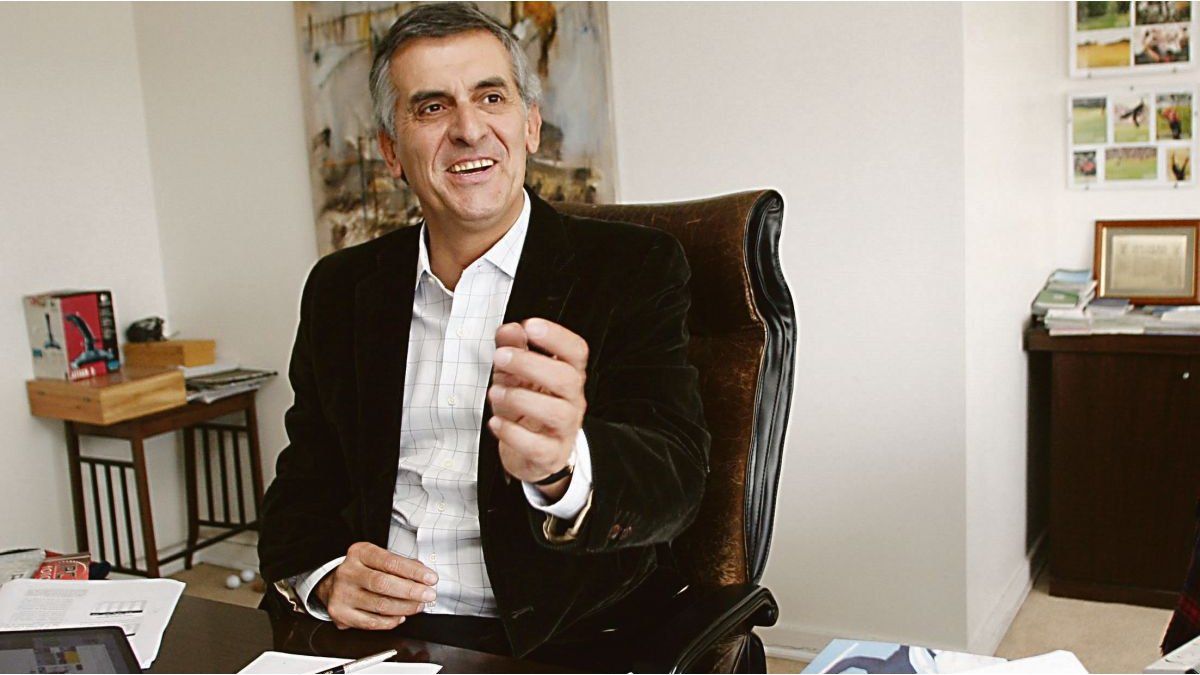Rodolfo Santangelo: It was an example to explain the current situation. It seems to me that at a time of electoral uncertainty where macroeconomic balances are still not all global, the absolute liberation of people restrictions to buy dollars, either to treasure, travel or resell it to companies, it was too hurried. And I said, obviously, when one maintains restrictions a gap appears, but today the attempt to stop the exchange rate with such a high interest rate, so positive in real terms is very expensive.
It has a lot of cost for the private sector, the public sector and the banking system. So, I said, if you are not going to let the exchange rate find its balance because Argentina is a very particular country, it would have preferred to maintain restrictions for an exchange gap to be the program exhaust valve and not this interest rate that will generate many costs.
Q.: Do you consider that now the intervention of the treasure in the change market is the product of not having done what is marking?
RS: The intervention is an additional attempt that the dollar does not reach the roof of the band, which has been closer to what we imagined before. But here there are two central issues. The first, and obviously we will know this only in November, is the opinion of one against the opinion of another, but I would have prepared a plan B. It must be seen if this is exclusively a matter of electoral uncertainty, where at the end of October the ruling party has a good choice and all the problems disappear, the demand for dollars lowers, the country risk lowers, the interest rate can be lowered, reservations are accumulated, or if there are other reservations.
Q.: From what he says, it seems that there are background issues.
RS: I personally believe that the electoral result is necessary but not sufficient condition. And then we will have to see how the November-December splicing is, because the most significant data we have from April until now, after the absolute release of people restrictions, is that people bought a lot of dollars. He bought a lot of dollars in May, in June, and the July number is crazy: 5,000 million dollars to treasure, to travel and to resell it to companies. There is no exchange market that endures it, there is no sale of the Treasury or the Central Bank or interest rate that endures it.
pag5-rodolfo santangel_op.jpeg
Rodolfo Santángelo: “We have to give the budget again the central role it has in any economy.”
Q.: A plan that, according to the government itself, its success or continuity is a bit subject to the elections, is it a sustainable plan? Or is there anything that is failing?
RS: Every plan needs both popular and institutional support. This government had popular support on presidential election day where Milei took 56% of the votes, is a phenomenal support. And there is no feeling that this support has evaporated because, at least, there are no great popular demonstrations against. With which, that popular support will ratify – or not – in October, especially in October. The September election is a local thing that can have an impact on expectations, but not institutional impact.
So, the results are those that sediment the continuity of a program or not. This program is very good in fiscal matters, that is clearly the greatest advance this government has made. Hopefully it is the legacy that President Milei leaves for subsequent generations: the need to have a solvent fiscal policy. The inflation rate has clearly lowered, which is another advance, they have improved relative prices. But there is clearly a problem in what is the operation of the exchange market. Being using the background silver to pay the debt is only a transient issue. And the Central Bank, the true way to recapitize it is not to pass the liabilities to the Treasury – because that is that my debt passes to my lady, nothing changes – but accumulate reservations.
Q.: Looking at the future dollar market, especially between November and December, what could we think about the continuity of the band scheme? Do you bet or suggest that after October it will be eliminated?
RS: The futures market reflects the spot exchange rate plus the interest rate, with a strong intervention by the Central Bank. So I pay less attention to the futures market, although obviously the amount of contracts or amounts involved reflects the need of many actors to have coverage.
Here which reflects the exchange market, the true thermometer, is supply and demand: who buys and who sells. And what we have seen so far, at least until August, is that there has been an exceptional demand for foreign exchange of individuals – to treasure, to travel or to resell it to companies – compensated transitarily by an exceptional offer of dollars of exporters, which will not be repeated. Everything gives the feeling that this will require, in Price Discovery, a higher exchange rate.
Q.: Rodolfo, you define yourself as a liberal economist. However, the latest measures of the economic team are on the opposite path. So, do you think Milei lowered her flags? When and why?
RS: The basic foundation of a market economy is macroeconomic stability. Without stability, without stable currency, without stable game rules, freedom works very badly. So, more than if I am liberal or Keynesian – which are labels that interest me less – what we need is a framework frame that provides stability. If in the interim you have to take measures of what is popularly called “Creole Macanazo”, where the defender kills the ball to the gallery, specific measures, I agree.
The issue is that the rules have to be consistent and sustainable. The sale of Treasury dollars, a central bank with few reservations and a treasure that faces a high country risk and does not have access to markets, is by somewhat transitory definition.
Q.: There are few economists and analysts claiming the Government to report daily how much they intervene. But he is not doing it. Do you think that data should share?
RS: Exchange information is published monthly. If you publish it every day or every week, we will enter those anxieties. Obviously the information has to be transparent. The data is published monthly, there is not so much need.
Here what you need to know is what they imagine forward. You have to endure to the elections. Since the Government has the diagnosis that this is electoral, we will continue like this until October, unfortunately. And then the horizon will have to be clarified.
Q.: In mid -2024, businessmen held a certain growth expectation in 2025. Now, when talking with various sources, most are subject to the electoral result to make decisions. Does the level of activity accompany the electoral challenge of the ruling party?
RS: It is clear that at the end of 2024 and in the first half of 2025, the month more or less depends, the level of activity had recovered all the fall and Argentina had had the usual rebound of economic activity that it has after a recession. Obviously with great heterogeneity, but 2025 was going to be better than 2024.
Here what is at stake is whether the usual third year of government – in this case 2026 – is a good or bad year. If we review the last three administrations, the third year was bad: the 2014 of Cristina Kirchner, the 2018 of Macri and the 2022 by Alberto Fernández. Until the middle of the year, the economic program faced a set of manageable challenges, not impossible. It seems to me that from the hand of what happened in recent months, the challenges are more complicated.
Q.: What does the government need to change its luck?
RS: For 2026 to be a positive year, with a growing GDP and with the main variables – inflation, exchange rate, reserves – in positive terrain, it will be key that, possections, in November and in the summer, it is possible to unravel the skein of the exchange market and monetary market. The three key variables will be the interest rate, the exchange rate and the country risk.
Q.: Regarding the new conformation of Congress, what projects should the government invariably present?
RS: The first thing we have to resume is the budget, which has to be the mother of all laws again to prevent Congress from creating that it can propose public spending increase projects that have no financing. It cannot be that throughout the year nine project increase projects that have no financing are discussed. We have to give the budget again the central role it has in any economy.
Then, if one would like, but I think it will take – and if you ask me, I think it will be more for a future administration than for this one – obviously the great reforms such as the tax, the pension, the work, it seems to me that they will still delay. Hopefully come before, but times are usually very slow.
Source: Ambito




